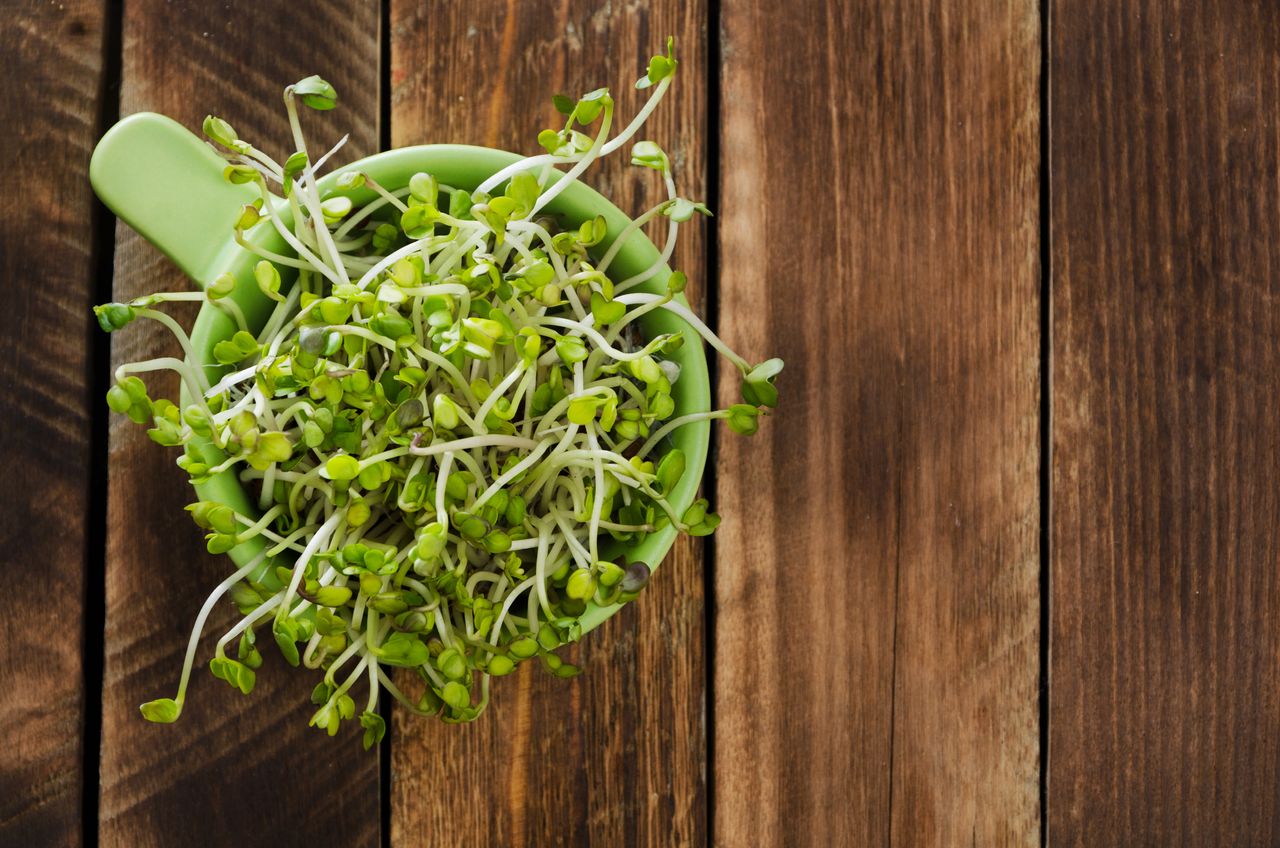Alfalfa sprouts, scientifically known as Medicago sativa, is a legume plant. It is also called lucerne. In India, it is known as Rijka as well. Alfalfa has medicinal properties and may serve as a herbal supplement. Also, another daily use is to feed livestock. Therefore, it has many nutritional properties and health benefits.
It may improve heart, gut, and liver health, boost immunity and increase testosterone in men. Additionally, it has many nutrients, vitamins, and antioxidants with health benefits. Therefore, it may be considered a superfood, and you may eat this superfood in the form of sprouts.

Improves Gut Health
Seed germination of Alfalfa can increase its nutritional value. In addition, soaking these seeds in water may release and activate many metabolites. These metabolites react with the gut microbes to provide health benefits. For example, the consumption of alfalfa sprouts can reduce the risk of IBS and inflammatory bowel disease.
Alfalfa sprouts also contain many proteinaceous enzymes that our body needs. Some of these enzymes include lipases, amylases, and invertase. All these enzymes help in biochemical processes in the body. For example, lipase helps in fat digestion, amylase in carbohydrate digestion, and sugar digestion. In addition, these enzymes help strengthen the digestive system.
Therefore, alfalfa seeds can lead to better bowel movement and prevent constipation. They also help reduce other disorders like gas, bloating, acid reflux and flatulence.
Alfalfa sprouts help neutralise the acidity in the stomach, thus preventing acid reflux. Alfalfa is also a good source of dietary fibres. A study suggested the effectiveness of soluble and insoluble fibres from alfalfa on nutrient digestion.
Alfalfa contains antibacterial and antiviral properties. It means, consuming Alfalfa may decrease the number of harmful bacteria and viruses in the body. As a result, it can prevent severe infections and illnesses. A study suggests Alfalfa’s antimicrobial properties were due to saponins. Additionally, alfalfa sprouts are a rich source of chlorophyll. Studies have established that chlorophyll is a green pigment that can protect against bacterial infections.
Also, Alfalfa contains a high amount of vitamin C. Consuming one serving of alfalfa sprouts can satisfy 15% of the required daily intake of vitamin C. Vitamin C is known for boosting immunity. Its importance was evident during the pandemic. Vitamin C can increase the production of white blood cells and other immune molecules.
Rich Source of Vitamins
Alfalfa sprouts are rich in vitamin content. Some vitamins found in high quantities are vitamin B, B2, B9, vitamin C and vitamin K. These vitamins provide many health benefits. For example, vitamin C helps boost immunity. Vitamin K helps speed up healing and helps in the blood clotting process. It can help speed it up and reduces the chances of infection in the wound. It also helps improve healing.
Furthermore, vitamin K and the calcium and magnesium in alfalfa help bones. They can increase bone strength and prevent bone disorders. For example, osteoporosis is a common bone disorder that can cause holes and pores in the bones. It makes them weaker and more likely to break. Therefore, a regular supply of vitamin K, calcium and magnesium is essential to bone strength.
The vitamin B complex helps stimulate metabolism in the body. Additionally, they aid in enzymatic activities occurring inside the body. These reactions are necessary for digestion to occur. Therefore, it can cause an improvement in digestion and metabolism. It may also give you more energy.
Alfalfa sprouts are low in calories. They contain only 7.6 kcal per cup of serving. Also, they have a low glycaemic index. It shows how it is a nutritionally dense food. It means that it contains an abundance of minerals, nutrients, and vitamins but low calories. It’s a great food if you are trying to lose weight. It keeps you full for longer and provides a good amount of nutrients. Moreover, it is rich in proteins and dietary fibres. Therefore, it keeps you satiated, which can prevent overeating.
The fibre-rich sprouts also help in losing weight. That is because the sprouts reduce the absorption of carbohydrates and sugars in the intestines. Additionally, the vitamin B complex found in alfalfa sprouts helps enhance metabolism. As a result, it can prevent excess fat build-up in the body, thus promoting weight loss.
